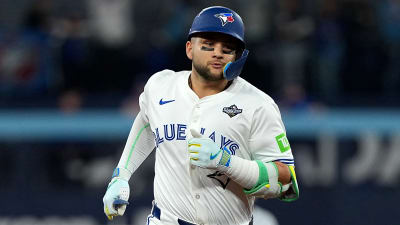
Should MLB push back game start times?
Next year, Major League Baseball should push back the start time of games to fully maximize the pace of play rules for television, according to research from a sports marketing and media rights firm.
The Thursday morning edition of the John WallStreet newsletter discussed survey findings from Playfly Insights that observed how fans perceived the rule changes, notably the pitch clock. The newsletter suggests that the brisker pace of play has led to an unintended consequence of games played in the Eastern and Central time zones are ending before 10 PM, which is generally the peak time of television viewing.
However, the brisk pace of play has inadvertently cost the league, many of its teams, and rights holders the highly viewed 10:00-10:30 p.m. nightly television window. Data suggests it would be smart business for clubs located in the Eastern and Central time zones to delay their start times 30 minutes next season to 7:40 pm.
Doing so would enable them and the other stakeholders to capitalize on broader viewership trends. Playfly Insights suggest a 3% increase in TV impressions during primetime telecasts could drive more than $10 million in additional ad revenue over the course of a 162-game season.
The new rules brought a lot of excitement at the start of the new season, with both traditional TV ratings and game attendance growing after the first month compared to 2022. SportsPro also said that minutes viewed on MLB.tv broke records for Opening Day.
However, baseball has the longest season of any of the major male league sports, stretching from the spring until the middle of fall. While MLB can get overshadowed by NBA and NHL playoff action and football in September and October, it largely has the stage to itself among the major male leagues in the summer. Although overall TV usage isn't as big during the warmer months, people still tend to watch more programming as the primetime hours progress. Any opportunity to capture the largest possible audience would be welcomed.
The data says as much, per JWS:
Moving first pitch from 7:10 to 7:40 would enable clubs to swap out the least viewed half hour of game broadcasts for a time period with a considerably larger available audience–and do it without further sacrificing young fans or early risers.
“If you look at the 10-10:30 half hour versus the 7-7:30 half hour, which is what the swap would be, there is a 26% difference in viewing amongst 18-49,” Gregg Liebman (head of research, Playfly Insights) said.
That increase would raise total viewership over a full game by 3%.
3% may not sound like a lot. But “in a marketplace where flat is the new up, and its so hard to get eyeballs, every impression matters,” Liebman said.
The data doesn't suggest any changes for games taking place out west, largely because the majority of the population lives in the East and Central zones. With commissioner Rob Manfred ever mindful of what research tells him and the league office, it wouldn't be a surprise if changing start times for games from Boston to St. Louis would go under consideration.
More must-reads:
- MLB considering limiting teams' spending in certain areas
- The best player to ever play for every MLB franchise
- The 'AL and NL MVPs since 2000' quiz
Breaking News
Trending News
Customize Your Newsletter
 +
+
Get the latest news and rumors, customized to your favorite sports and teams. Emailed daily. Always free!








